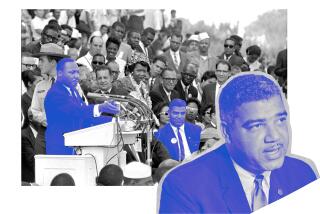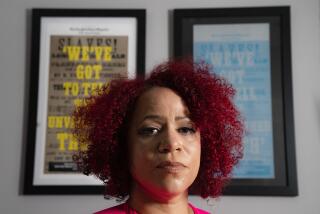Sorry, I’m Just Not Myself Today
- Share via
WASHINGTON — I’m not Andrew Young. I’m not Roger Wilkins either.
But I’m often mistaken for both.
There are worse things than to be mistaken for these two highly accomplished achievers. Young is a former ambassador to the United Nations and the former mayor of Atlanta. He was a close confidant of Martin Luther King Jr. Today, he owns an international consulting firm. Wilkins was a journalist at the New York Times and at the Washington Post, where he shared in a Pulitzer Prize for the paper’s Watergate coverage. Before that, he was an assistant attorney general of the United States. He’s now a respected author, a professor at George Mason University and a member of the Washington, D.C., school board.
The three of us have much in common. We are all male. All three of us had connections to the civil rights movement. Each has been in the public eye for decades. We have all held public office, two of us in Atlanta. Two of us now live in Washington. Two are university professors. Two of us--the youngest and eldest--have gray hair. Two are tall.
Most notably, we are all black--victims not only of mistaken identity but also of the “blacks-all-look-alike” syndrome.
The experience of being mistaken for another person based largely on being the same race can range from the mildly annoying to the nearly fatal, as a long list of convicted but ultimately exonerated people can attest.
For me, it began in 1976 when the Boston Globe reported that then-presidential candidate Jimmy Carter “would have to do more than bring Julian Bond to Boston” to prove his civil rights bona fides. But it was Andrew Young, not Julian Bond, who accompanied Carter; that year, I supported the Bay State’s own Sen. Edward M. Kennedy for president.
From then until now, I’ve been blessed and cursed to be confused with Wilkins and Young.
“Hello, Mr. Mayor” is a common greeting I receive across the country.
Since Wilkins joined the Washington school board, I’ve been thanked by many grateful citizens of the nation’s capital for taking on this difficult task.
I’ve been credited with making “the best speech I ever heard” in places I’ve never appeared. People I’ve never met have met me and have tales to tell about our meeting. I’ve been a guest in homes I’ve never visited and at banquet tables where I never dined.
Wilkins once told me of a businessman who complained to him that few blacks, except Julian Bond who sat with him, had attended the Gridiron Club dinner the night before. In fact, it was Wilkins himself who had graced the man’s table.
My knees have bounced children--now grown to adulthood--whom I’ve never seen or held. Don’t mention the women I’ve kissed whose lips have never touched mine.
And I’ve been praised for statements I’ve never made and books I didn’t write.
It has happened so frequently that I’ve composed a response--”Remember, Young is older; Bond is younger.”
I’m still working on a Wilkins phrase.
(Full disclosure requires me to admit that one of us has contributed, on at least one occasion, to this confusion. Emerging from a clandestine location, he was greeted heartily by the name of a second. He responded that he was actually the third of the apparently interchangeable trio. That he was believed was confirmed when the third was asked, a couple of decades later, to explain his presence at the scene.)
Last month, the New York Times reported I had “distanced” myself from Rep. Cynthia A. McKinney (D.-Ga.) in her unsuccessful reelection campaign.
Once again, I had been confused with Andy Young--this time by a reporter whom I have never met and with whom I have never talked.
In fact, I have not lived in Atlanta for 14 years. I neither supported nor opposed McKinney, despite her steadfast support for NAACP issues, in this or any previous race, and therefore couldn’t “distance” myself from her. As NAACP board chairman, I am prohibited, as is all our leadership, from engaging in partisan politics.
In an apologetic voice mail message, the New York Times reporter said she had written “former Atlanta Mayor Julian Bond.” Her crack copy desk, sensing a mistake, dropped “former Atlanta Mayor,” replacing it with “Chairman of the NAACP.”
Of course, they should have dropped “Julian Bond” and replaced me with “Andy Young.” Young had previously endorsed McKinney and declined to do so this year.
Writing on an unrelated topic, New York Times columnist William Safire recently said that the paper “willingly corrects itself when in error.” The New York Times did print a correction in my case, but like all such journalistic admissions of inaccuracy, it was no doubt seen by many fewer readers than the original mistake.
The Times’ error threatened public perception of the National Assn. for the Advancement of Colored People. It placed me in a political position I neither sought nor embraced. It was a new low in the mistaken-identity department.
Perhaps in our age group, only a few African American names and faces command public recognition, although many more should. Perhaps as we’ve aged, Wilkins, Bond and Young look more alike than we believe we do.
If only whites made this mistake, it would be easy to infer something insidious about racial attitudes. But as time has passed, blacks have also confused me with other members of the trio, and them with me, suggesting black interchangeability is becoming race neutral.
Maybe growing cross-racial misidentification is some odd signal of racial progress? Perhaps a next step toward racial harmony will be confusing prominent whites for blacks, and vice versa. Does this take colorblindness to a new level?
Whatever it all means, I have this to say: I’m not those other guys. And they aren’t me.
More to Read
Sign up for Essential California
The most important California stories and recommendations in your inbox every morning.
You may occasionally receive promotional content from the Los Angeles Times.













